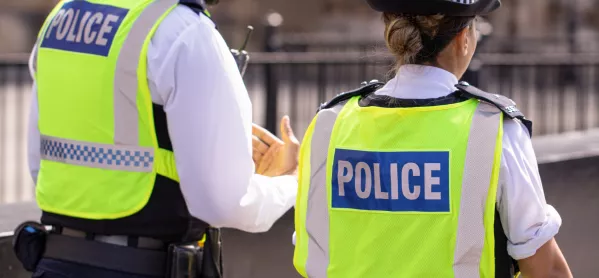- Home
- What being a police officer taught me about teaching
What being a police officer taught me about teaching

I’m only at the beginning of my journey as a special constable - a volunteer police officer - but I have loved the past 18 months of serving the public and being crewed with 999 response officers on the front line. Considering that my background is that of a teacher - predominantly in post-16, but also in secondary school - it seems only natural to compare policing with teaching. So here are some of the key differences I have found between a typical 10-hour policing shift and the 10-hour teaching day many of us work once you include the early morning preparation panic and the after college catch-up admin.
Policing vs teaching
Officers arrive for the day’s shift, on average, 15 minutes before the shift begins. If an officer arrives at the station five minutes before the usual briefing, there are no stunned looks or judgemental glances, there is no panic or rushing around. Can you imagine how “daring” and even unprofessional this would be seen to be in some educational settings?
Teaching in FE: How different is teaching online from the classroom?
Background: FE teachers face higher workload than those in schools
Body cameras: Could body cameras help to boost teaching and learning?
Prioritising necessary tasks
During the briefing, sergeants will consult the team calendar and individual officers on any planned commitments for that day’s shift. At first, I assumed this related to vital policing work that had to be undertaken immediately for the greater good. I was stunned to hear officers reply, “Yes, Serge, got some paperwork and emails to catch up with so will need an hour or so to do that.” To my surprise, the sergeants would nod, no questions asked, and set out that the officer will not be available for that time. Can you imagine if teachers turned to their line manager, refusing to go to a meeting, teach, do a 1:1 or mark because they had “paperwork and emails” to catch up with?
Could teachers use body cameras?
While the introduction of body-worn cameras (BWC) stirred some anxiety from officers when it was first announced, it has resulted in 90 per cent fewer police complaints and now receives an overwhelmingly positive response from officers. It results in greater transparency, accountability and is a fantastic tool for instant feedback. I understand some colleges and schools in the UK trialled the use of BWC. I don’t want to wade into this debate too much, but can you imagine BWC being incorporated in educational settings? Could I rewatch a lesson I taught and instantly see where improvements could be made? Which students did I miss day-dreaming? Did I explain that concept well? What was my positioning? My tone of voice? Could this be a new form of lesson observation or actually make that process redundant? Could BWC be a new form of “self-assessment” lesson observation? Could this be an amazing tool for trainee teachers and NQTs?
The great workload debate
The camaraderie and teamwork of officers is truly inspiring. I wonder whether, beyond the typical jokes, storytelling and moans in a staffroom, this is where the education system is lacking. Considering that we have an increasingly data-driven and pressured education system, are teachers becoming more resentful, jealous of and competitive with each other? The classic exam-based versus coursework debates around who has the greatest marking load is one of my personal favourites. Of course, police officers have varying workload and case files, but I’ve never once sensed any tension between officers in the way I do between teaching colleagues.
Stationery? No problem!
The stationery cupboard in a police station is something to admire. All the forms are printed, organised and ready to go. No police officer dashes around the station printing anything in a mad hurry and (oh my!) They have limitless supplies of pens, Sellotape, staplers, highlighters and actual Pritt Sticks! My police colleagues are often stunned when I explain that it’s pretty normal for many teachers to buy their own “materials” including whiteboard pens, planners and Post-it notes, but also resources for our students, too, such as coloured card, plastic wallets and folders.
Colleagues able to support each other
Quite fittingly, the most memorable part of my police shifts is often this final part: many times towards the end of a police shift, a colleague will have finished perhaps 30 minutes early. They will walk around the team and ask whether anyone needs any help or if there is anything they can do to help. I wish I heard more of that in teaching staffrooms. I trust that teaching and support staff would love to ask these questions, but in such busy, pressured education environments, it simply cannot be asked. Too tight are the time constraints, and teachers are too stressed and focused on getting through the day to even think of asking this question.
I’m not trying to give the impression that the police force is perfect, nor am I stating that the education system is doomed and hopeless. However, the advantage of a “second job” alongside teaching is that it has given me the opportunity to see things from a fresh perspective and take on new ideas. I’ve been fortunate enough to compare two public sector jobs, and I cannot recommend strongly enough that other teachers spend some time in a non-education setting. It may allow us to break away from that teacher bubble that we too often inhabit.
Claire Allen is a sixth-form college teacher in Bristol
Keep reading for just £1 per month
You've reached your limit of free articles this month. Subscribe for £1 per month for three months and get:
- Unlimited access to all Tes magazine content
- Exclusive subscriber-only stories
- Award-winning email newsletters